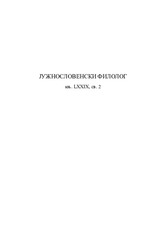ГЛАГОЛСКИ СИСТЕМ ГОВОРА ПРИЛУЖЈА КОД ВУЧИТРНА
VERBAL SYSTEM OF THE PRILUŽJE DIALECT IN VUČITRN
Author(s): Bojana M. Veljović PopovićSubject(s): Lexis, South Slavic Languages, Phraseology
Published by: Институт за српски језик Српске академије наука и уметности
Keywords: Prilužje; dialectology; dialectal syntax; verb forms;
Summary/Abstract: The paper analyzes the use of verb forms in the speech of the village of Prilužje near Vučitrn. The inventory of syntactic units and their syntactico-semantic conditions of use is determined, as well as the stylistic effects that individual units achieve on the functional level. It has been shown that the Prilužje dialect has a relatively preserved and stable system of verb forms. Present and future tense have a stable position in the system of this dialect, while the future II tense has become obsolete. In addition to its primary function of indicating actions that belong to the present, the present tense is also used in its secondary function to denote past and future actions. Future I is used exclusively to indicate future actions, and there are no confi rmations of its temporal transposition. The system of past tenses consists of the perfect tense, which belongs to a group of high-frequency units, and aorist and past perfect, which are comparatively more rarely used. There is no evidence of the use of imperfect in the recorded data, which implies that this verb form has been eliminated in this part of the Serbian ethnolinguistic territory. Modal verb forms – imperative and potential – are frequent in this idiom and are used as temporally transposed units in addition to their primary modal function. Past repeated actions can also be marked with narrative potential and imperative (in this function, their synonym is narrative present), while past individual actions are expressed exclusively by narrative imperative. The present participle is noted in some examples, while there is no past participle in this dialect. The active participle is used in the composition of complex verb forms, and its position in the system is stable, while the passive participle has a lower frequency.
Journal: Јужнословенски филолог
- Issue Year: 79/2023
- Issue No: 2
- Page Range: 121-149
- Page Count: 29
- Language: Serbian

